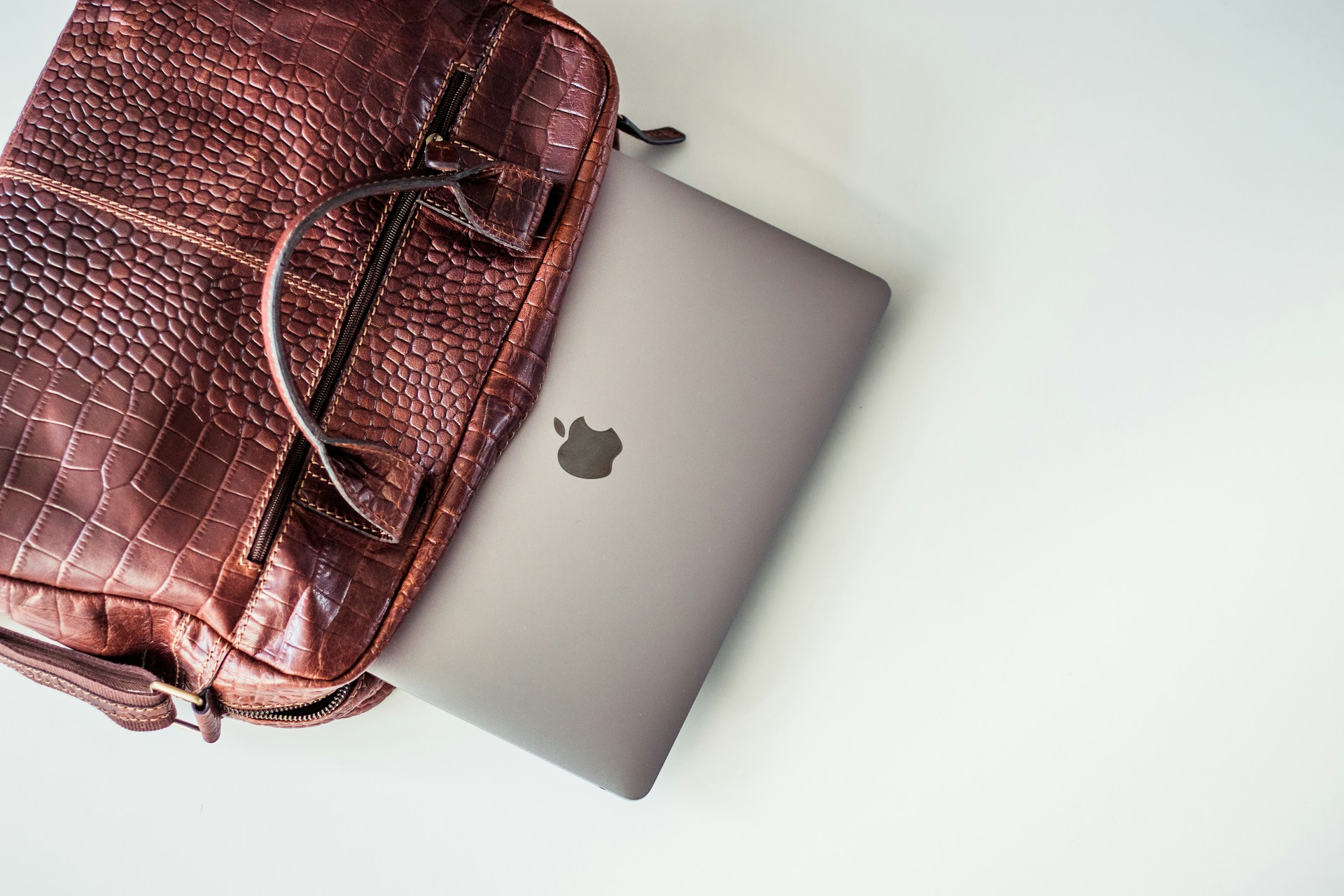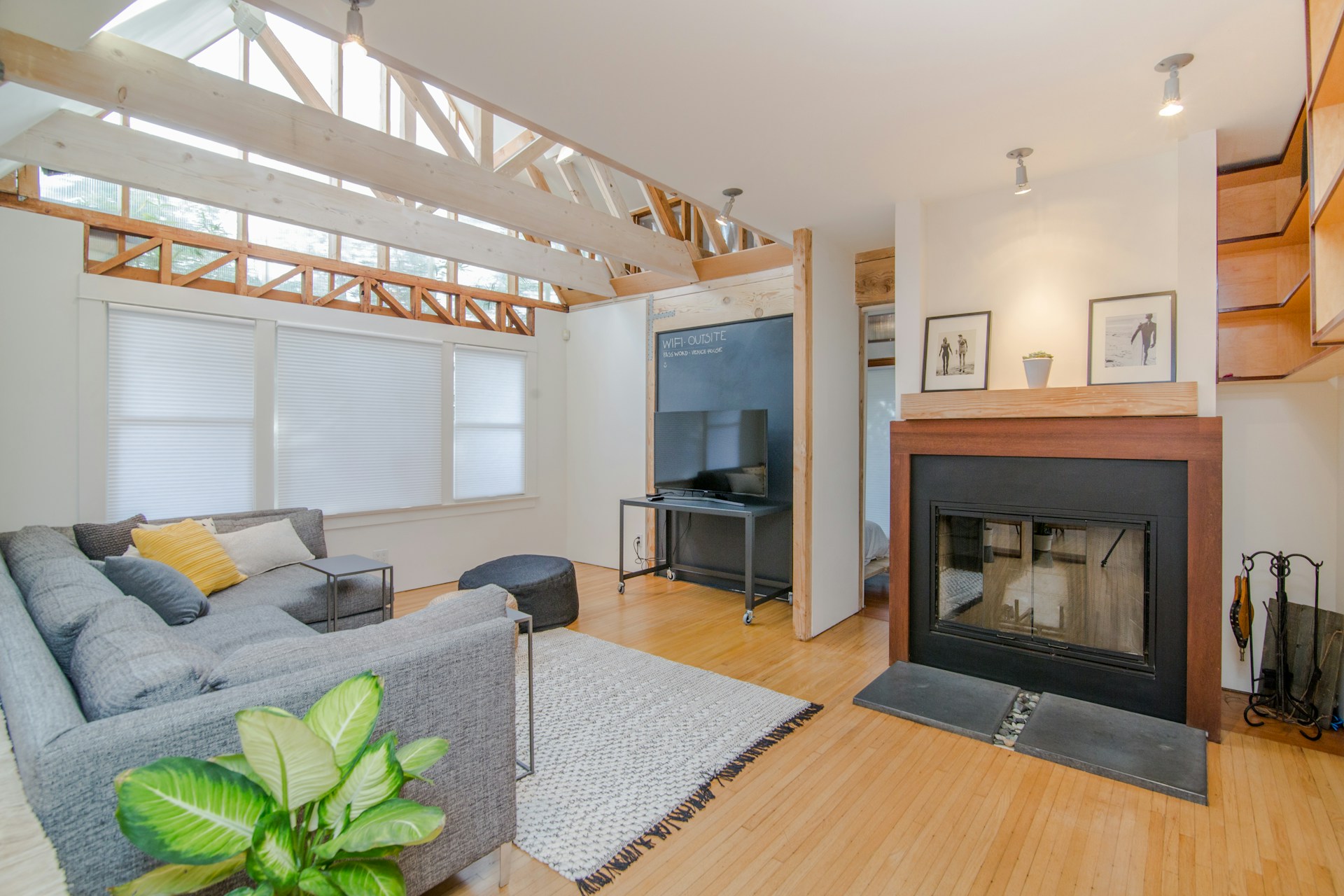Digital Nomads in Malta: Work and Lifestyle Tips
Discover how to be a digital nomad in Malta: Visas, accommodation, costs and tips for an unforgettable experience in the Mediterranean.
Malta, an archipelago in the heart of the Mediterranean, is famous for its breathtaking scenery, its more than seven thousand years of history and its unique blend of cultures, where antiquity meets modernity.
The combination of heritage and modern lifestyle makes it an irresistible place to be a digital nomad in Malta. So sit back and read for a comprehensive guide that will provide you with the key information every digital nomad needs to know about settling down to live and work on the island.
Why choose being a digital nomad in Malta?
Malta is a perfect place to be your office and carry your laptop and work tools around for the following reasons:
- Mediterranean climate: Malta enjoys over 300 days of sunshine a year, making it an ideal place to work and visit for those who love the warmth. Temperatures are pleasant even in winter, making it easy to enjoy outdoor activities.
- History and culture: From the impressive cities of Valletta and Mdina to the megalithic temples, Malta is full of historical sites. The mix of Italian, British and Arab influences is reflected in its architecture, cuisine and traditions.
- Nomad community: The island is home to a multicultural community of digital nomads, with coworking spaces and regular events that make it easy to connect with other professionals.
Visas allowing residence as a digital nomad in Malta
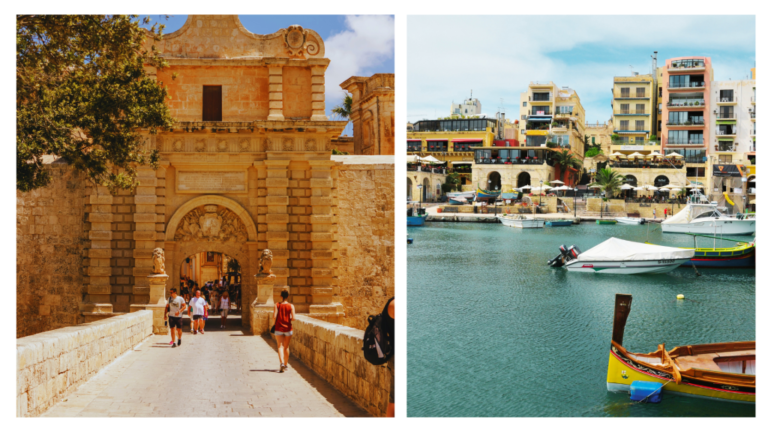
Malta offers a digital nomad visa that allows remote workers to live in the country while maintaining their employment abroad. Other types of visas may also be suitable, depending on your situation. Below we detail the characteristics of this visa:
| Duration | Requirements | Application process | |
| Digital nomad visa | The digital nomad visa is valid for one year, with the possibility of renewal if you continue to meet the requirements. | To apply for this visa, you must prove that you work for a company outside Malta or that you have your own international clients. A minimum monthly income is also required, which ensures that you can support yourself while residing on the island. | Application can be made online or through the Maltese embassy or consulate in your country. It is recommended that you have all documentation ready, including proof of income and health insurance. |
For more information about the specific visa, read our guide where we explain step by step the procedure and the documents to be submitted to obtain the digital nomad visa for Malta.
Where to live and work as a digital nomad in Malta
1. Valletta
Valletta, the capital of Malta, is a stunning destination that combines history and culture. Its cobbled streets and baroque architecture create a unique atmosphere, while the views of the Mediterranean Sea are spectacular.
Valletta is perfect for those who seek inspiration from their surroundings. With numerous cafés and coworking spaces, digital nomads can enjoy a creative and stimulating working environment. In addition, its lively nightlife and cultural events, such as festivals and art exhibitions, allow residents to enjoy a rich social offer.
2. Sliema
Known for its beautiful coastline and shopping scene, Sliema is one of the most popular destinations for its blend of modernity and local charm makes it an attractive place to live and work.
Sliema offers a good variety of coworking spaces, as well as cafés with good internet connection and sea views. The proximity to Valletta and other points of interest makes Sliema a strategic point from which to explore the island, while its beaches and coastal promenades provide opportunities to relax after a day’s work.

3. St. Julian’s
Famous for its nightlife and youthful atmosphere, St. Julian’s is ideal for those seeking a balance between work and play. Its bars, restaurants and nightclubs make this area a dynamic and social place.
In St. Julian’s, digital nomads can find modern coworking spaces and lively cafés to work in. The expat and nomad community is active, which makes socialising and networking easy. What’s more, the range of recreational activities and social events allows residents to enjoy a balanced life between work and leisure.
These three cities offer a unique environment for digital nomads, each with its own character and opportunities.
Accommodation options
Co-living spaces and shared accommodation
If you are looking for co-living spaces in Malta, there are several online platforms that can help you find a place that suits your budget and needs, such as Airbnb.
You can also visit Coliving.com a platform exclusively dedicated to co-living spaces worldwide, making it easy to search for specific options in Malta. Joining Facebook Groups related to digital nomads in Malta is a great way to get recommendations on accommodation and workspaces, as well as to connect with other residents.
The co-living space Evolve for example, located in San Ġwann, is an attractive option for digital nomads looking for a communal and functional environment.
Features:
- Modern design: Cosy and contemporary spaces, perfect for working and relaxing.
- Private and shared rooms, with prices ranging from $600 to $1,200 per month.
- Workspaces: Well-equipped coworking areas with good internet connection.
- Community activities: Regular social events that encourage interaction and networking.
- Convenient location: Close to Sliema and Valletta, with easy access to shops, restaurants and public transport.
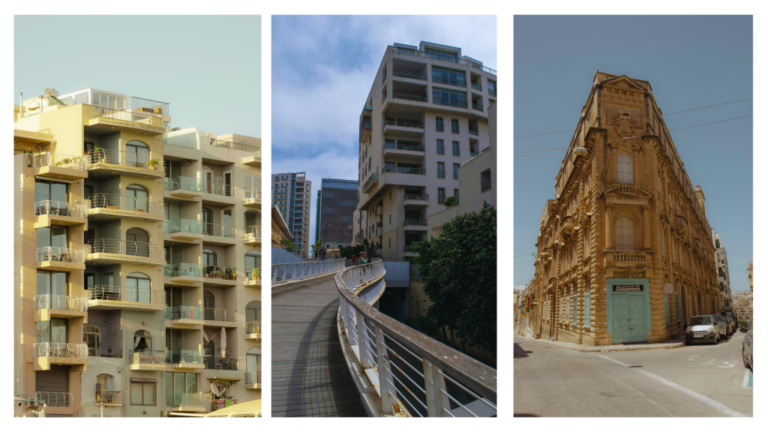
Hotels
- Budget: There are budget hotels ranging from $50 to $100 per night, such as the Argento Hotel in Sliema.
- Mid-range and high-end: If you prefer more comfort, mid- to high-end hotels can cost between $150 and $300 per night, such as the Hilton Malta in St Julian’s.
Coworking spaces in Malta
Malta has a variety of coworking spaces for digital nomads. Here are some of the most popular:
- 1. The Hub (Sliema): A cosy space offering different membership plans, with rates starting at $15 per day and $100 per month. In addition, they organise networking events that make it easier to connect with other professionals.
- 2. 230 Work (St Gwann): This modern space offers an inspiring atmosphere with well-equipped facilities. Prices range from $20 per day to $150 per month, with options for meeting and event rooms.
- 3. Grand Central (Valletta): With its contemporary design and multiple work areas, Grande Central is ideal for those seeking a professional environment. Fees are approximately $10 per day and $120 per month. Meeting rooms and lounge areas are also available.
- 4. Fab Lab (Valletta): This space has work areas and access to digital fabrication tools and creative workshops. Fees are $15 per day and $100 per month, with a focus on innovation and design.
Public spaces with internet
If you prefer to work in a more relaxed environment, Malta offers several public spaces with good internet access:
- Cafés: Such as Nenu the Artisan Baker in Valletta, offer free Wi-Fi and a friendly working environment.
- Parks: Some parks, such as Upper Barracca Gardens in Valletta, have areas where you can sit and work outdoors, enjoying panoramic views.
- Libraries: The Malta National Library in Valletta offers quiet spaces and Wi-Fi, excellent if you need a quieter environment.
Connect worry free to the internet with Holafly’s Data eSIM! We give you unlimited data and high speed in over 100 destinations, including Malta, with no roaming charges. Stay in touch with your projects and family without interruption.
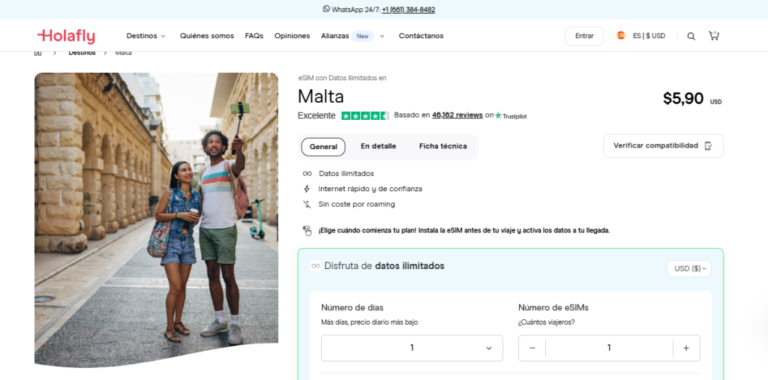
Taxes to be aware of as a digital nomad in Malta
Digital nomads who spend more than 183 days in the country during a calendar year may be considered tax resident in Malta. This means that you will be subject to Maltese tax laws and will have to declare your overall income. It is essential to take these rules into account to avoid unpleasant surprises when filing your tax return.
Double taxation treaties
One of the advantages of living in Malta is its network of double taxation treaties. Malta has agreements with 70 countries, allowing residents to avoid double taxation on income.
This means that if you are a tax resident in Malta and also have income in your home country, you may not have to pay tax in both places.
Some of the countries with which Malta has double taxation treaties include:
- United States
- United Kingdom
- Germany
- France
- Italy
- Spain
- Canada
- Australia
These arrangements are beneficial for digital nomads, as they allow for better tax planning and can help maximise your income.
For more information on how remote professionals pay taxes more specifically, we recommend that you consult the link on taxes for digital nomads.
Important: If you are a frequent traveler and want to stay connected without worrying about expensive roaming or looking for a new SIM at every destination, Holafly’s subscription plans are for you. With a single eSIM, enjoy internet in more than 170 countries for a fixed price and no surprises on your bill. Travel without limits and connect easily and securely! 🚀🌍

Public and private health care system in Malta
Malta has a public health system that provides medical care to residents and citizens. Services are of good quality and free to those who are registered, although some treatments may require co-payments. Public clinics are available throughout the island and are a good option for general care.
On the other hand, the private health care system is also very accessible and offers shorter waiting times. Private care is usually fast and of high quality, with doctors who speak English and, in some cases, Spanish. A basic medical check-up at a private clinic can cost between $53 and $106, depending on the services included.
Recommended health insurance
Good international health insurance is highly recommended for the lifestyle of a digital nomad who decides to settle in Malta. Your insurance should cover both medical emergencies and regular care, including consultations and treatment. Some insurance companies that are well rated among digital nomads include:
- SafetyWing: This offers health insurance specifically designed for digital nomads, with international coverage and affordable prices.
- World Nomads: Ideal for those who practice extreme sports or travel frequently, with good emergency cover.
- Allianz Global Assistance: Provides a range of plans including medical care and evacuation.
It is important to read the conditions of each policy and make sure that it covers the services you might need during your stay.

Basic expenses for the daily life of a digital nomad in Malta
Knowing your daily expenses is relevant for a successful living experience as a digital nomad in Malta. Here is a breakdown of some of the important expenses:
Transport and mobility in Malta
Public transport options in Malta are varied. Buses are the cheapest way to get around the island, with an average ticket costing $1.60. Shared taxis or ridesharing services such as Bolt are also available, although they are more expensive.
If you prefer to drive, you can drive with your foreign licence for a period of up to one year, provided that it is in English. Otherwise, you will need an international permit. Remember that traffic can be heavy, especially in tourist areas, so it is best to take public transport.
Financial management
When it comes to finance, the most recommended banks for foreigners are HSBC and BOV (Bank of Valletta). Both offer euro accounts and services in English. There are also digital banking options such as Revolut which allow you to make transactions with minimal fees.
ATMs are widely available, but be sure to check international usage fees. To minimise costs, look for ATMs at your bank that do not charge foreign withdrawal fees.
To exchange your money into euros, which is the currency of Malta, using exchange offices in central locations and banks is advised, as the rates are more favourable here. Avoid exchanging money at the airport, as the rates are often less favourable. Banks such as HSBC and BOV offer competitive rates and reliable service.
Food costs
Food costs in Malta are reasonable. Supermarkets such as Lidl, and Pavi are excellent for your daily shopping. Commodity prices are competitive; for example, a litre of milk costs around $1.18, and a packet of pasta can cost between $0.85 and $1.60.
When it comes to eating out, an average lunch at an inexpensive restaurant ranges from US$11 to US$16. For cheaper options, consider local markets, where you can find delicious food at affordable prices.
Entertainment in Malta for digital nomads
Malta offers a wide range of entertainment options. Here are some activities not to be missed:
- Water sports: From scuba diving to paddle surfing, Malta’s crystal clear waters are perfect for outdoor activities.
- Hiking: Routes such as Dingli Cliffs have spectacular views.
- Cultural festivals: The Malta Carnival and the Feast of St. Julian are vibrant celebrations that reflect the local culture.
Don’t forget to explore the old town of Mdina and enjoy the beaches of Gozo which are ideal for a day trip.
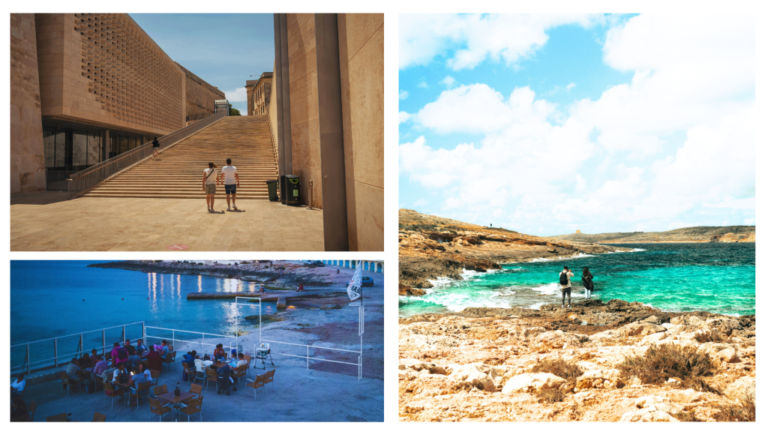
Best seasons to be in Malta
Malta’s climate is Mediterranean, which means mild winters and hot summers. The best time to visit is from April to June and September to October, when the weather is ideal for exploring and enjoying the outdoors. During these months, temperatures range between 20 and 30 degrees Celsius.
When packing for Malta, consider packing light and comfortable clothing, especially for the summer. Here are some recommendations for the essentials:
- Light clothing: T-shirts, shorts and summer dresses are a must.
- Sun protection: Sunglasses and a hat are essential, especially if you plan to be outdoors.
- Comfortable shoes: For exploring the cities and walking on trails, wearing appropriate footwear is advised.
- Light jacket: Although the weather is mostly warm, evenings can be cool, especially in spring and autumn.
Cost of living of a digital nomad in Malta
When considering the cost of living as a digital nomad in Malta, it is essential to compare various factors such as accommodation, transport, food, leisure and medical expenses. Here is a breakdown to help you get a clearer picture:
| Category | Description | Price range (USD) |
| Accommodation | Co-livings | 600-1,200 USD per month |
| Shared accommodation | 400-800 USD per month | |
| Budget hotels | 50-100 USD per night | |
| Mid-range hotels | 150-300 USD per night | |
| Rental flats | 800-2,000 USD per month | |
| Transport | Bus ticket | 1.60 USD |
| Car rental (daily) | 30-60 USD per day | |
| Food | Supermarket food (litre of milk) | 1.18 USD |
| Meals in a budget restaurant | 11-16 USD per head for lunch | |
| Entertainment | Recreational activities (e.g. water sports) | 20-50 USD per activity |
| Festival tickets | 10-30 USD per event | |
| Health insurance | International health insurance (monthly) | 40-100 USD per month |
Estimated monthly total | 1,298 to 4,350 USD |
Frequently asked questions about being a digital nomad in Malta
You will need to apply for a digital nomad visa, which allows you to reside in Malta while working for a foreign company or having international clients.
You must prove that you work for a company outside Malta or that you have international clients, as well as meet a minimum monthly income.
The average cost of living for a digital nomad can range from $1,500 to $4,000 per month, depending on your spending on accommodation, food and entertainment.
Malta has a public health system that offers free quality care for residents. There are also private health options with shorter waiting times and high-quality services.
Options include co-living spaces, shared accommodation, budget hotels, mid-range hotels and rented flats. Prices range from $50 to $2,000, depending on your chosen option.
The best time to enjoy Malta is from April to June and September to October, when temperatures are pleasant and the weather is ideal for outdoor activities.
Using banks such as HSBC and BOV, and avoiding changing money at the airport are both recommended. Bureaus de Change and banks offer more competitive rates. Make sure you have access to ATMs that do not charge high fees.





 Language
Language 


















 No results found
No results found




